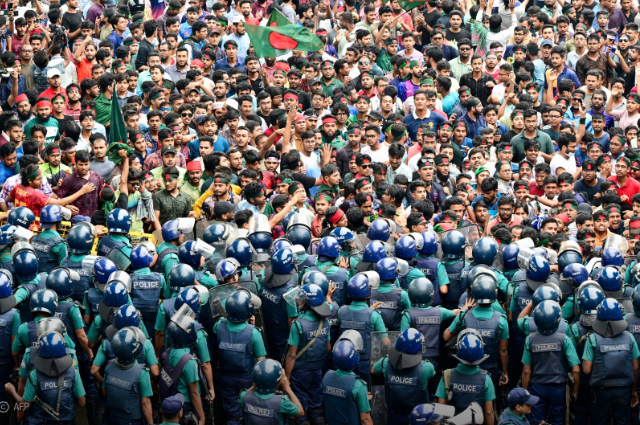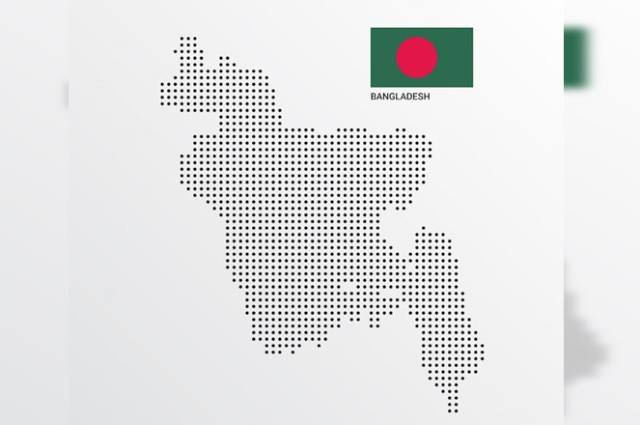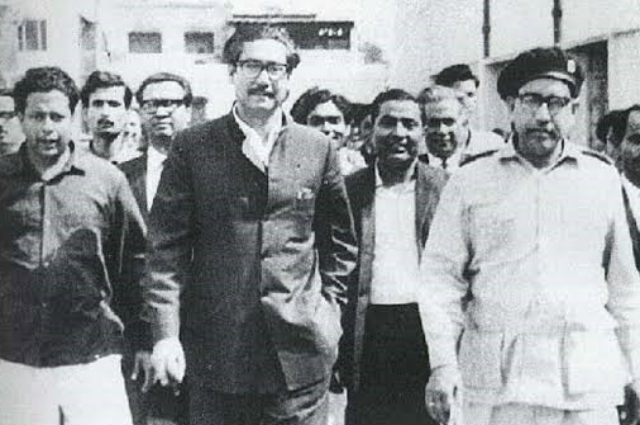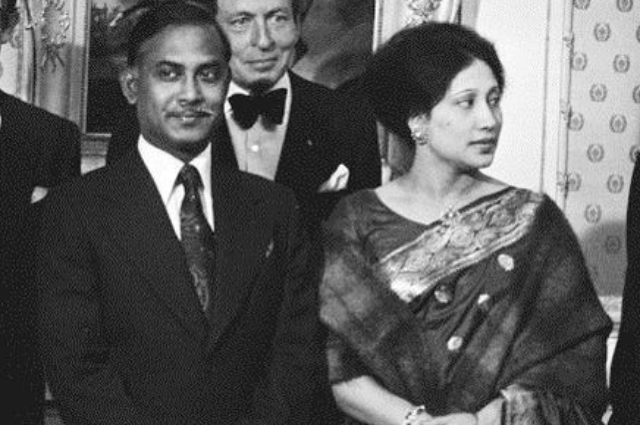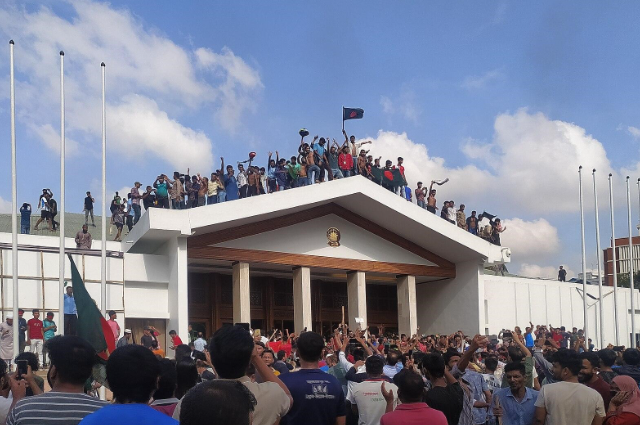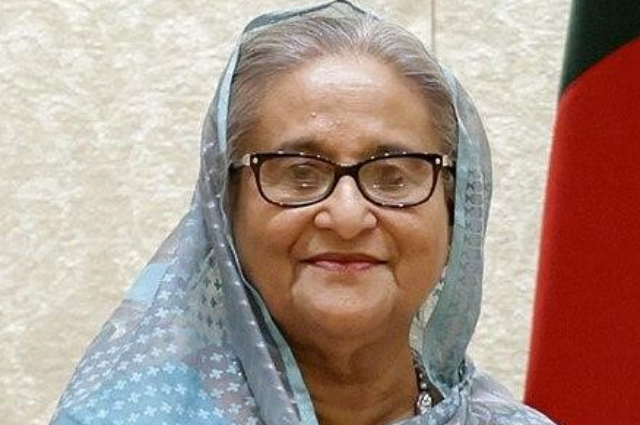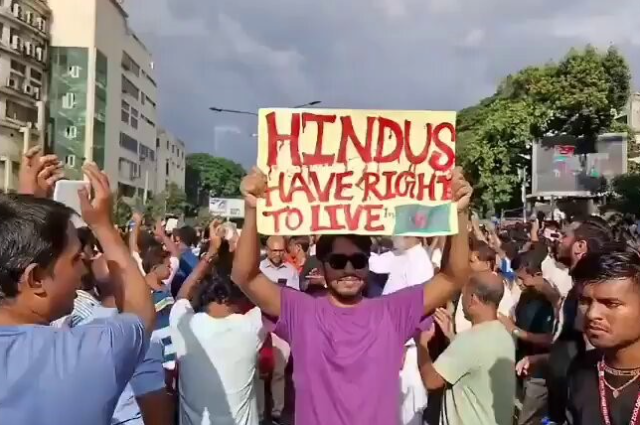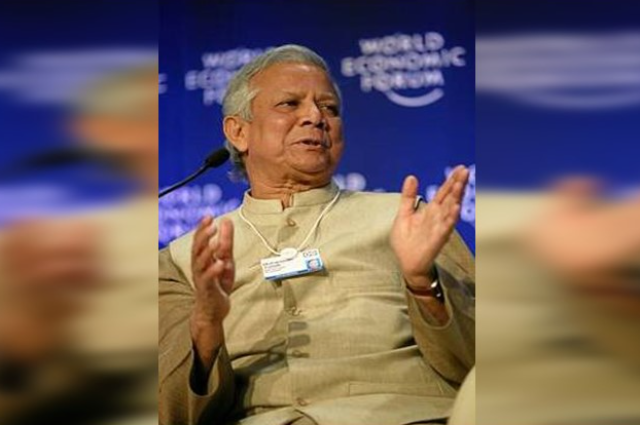In the wake of escalating violence and a fierce backlash following the resignation of former Prime Minister Sheikh Hasina, an "undisclosed location" has become the most sought-after refuge for members and supporters of the Awami League in Bangladesh. These secretive hideouts are perceived as the safest shelters for those aligned with Hasina’s party, who now find themselves targeted alongside minority communities.
Awami League functionaries, now in hiding had to respond to inquiries with the cryptic assurance that they are "alive, safe, and tense", but offer no details on their location. The prevailing fear is intense, as even routine communication is avoided or handled with extreme caution.
Background and Disturbing History of Bangladesh: The Formation of East Pakistan
In 1947, the Partition of India resulted in significant changes in the Bengal province. Unlike, the rapid and violent exchanges seen in Punjab, the situation in Bengal involved millions of Bengali Muslims who found themselves in Indian territory. While a substantial number of non-Muslims remained in East Pakistan, making up about one-fifth of its population. This demographic shift led to conflicts over resource distribution, which soon escalated into a larger debate over the national language. The question arose: should Urdu be the sole national language or should Bengali also be included? This dispute sparked the bhasha andolon, or Language Movement in 1952. The Pakistani army responded to the violent protests with severe domination, which not only crushed hopes for immediate change but also ignited aspirations for a secular and autonomous identity for the region. By 1956, Pakistan recognized both Urdu and Bengali as state languages but the movement had evolved beyond just language rights to include broader issues of autonomy and equitable resource allocation.
The Rise of the Awami League
In the 1970 elections, the Awami League emerged victorious by winning 167 out of 169 seats allocated to East Pakistan in the National Assembly. This overwhelming success gave them significant power, but Yahya Khan and the then-leader of Pakistan had postponed the assembly session. While negotiations with Mujibur Rahman were underway, Khan ordered the military to suppress the autonomy movement that was leading to widespread targeted violence across East Pakistan. This brutal crackdown resulted in the Liberation War of 1971.
The Birth of Bangladesh: India's Involvement and the Liberation War
India intervened in the conflict, positioning itself as a supporter of Bangladeshi self-determination. It provided military training to freedom fighters and accepted refugees fleeing the violence. Pakistan viewed this support as unacceptable interference in its internal affairs. The leadership of the Awami League reformed in India and thereby establishing a government in exile. On December 3, 1971, the Indo-Pak war erupted when Pakistan attacked Indian airfields thereby concluding on December 16 with the establishment of Bangladesh as a new nation.
Sheikh Mujibur Rahman's Leadership
In January 1972, Sheikh Mujibur Rahman returned from imprisonment in Pakistan and took charge as the leader of the newly formed Awami League government. He banned Islamist parties and committed the new constitution to principles of democracy, socialism, secularism, and nationalism. However, Mujibur's approach relied heavily on his charismatic leadership and patronage, which limited economic opportunities for the population. As the government cracked down on opposition, discontent grew, worsened by a devastating famine in 1974.
Challenges and Assassination of Mujibur Rahman
- Emergency Rule and Political Turmoil: By 1975, Bangladesh was declared to be in a state of emergency, leading to the suspension of fundamental rights and the establishment of a single-party presidential system with Mujibur as president. He attempted to initiate a social revolution from above, but the military that was annoyed by Mujibur's close ties with India and the perceived loss of power intervened. On August 15, 1975, a coordinated assassination plot resulted in Mujibur's death along with 40 members of his family. This event marked the beginning of a tumultuous period in Bangladeshi politics.
- Military Rule Takes Over: Following Mujibur's assassination, Bangladesh experienced further instability with two additional military coups. General Ziaur Rahman emerged as the leader, ruling until his assassination in 1981. Subsequently, General Ershad seized power in a coup in 1982 by declaring Islam the state religion. However, in 1990, a popular uprising forced Ershad from power and thereby restoring civilian rule to Bangladesh.
The journey of East Pakistan to become Bangladesh was marked by significant struggles for identity, autonomy and governance. The initial hopes for a united and equitable nation faced numerous challenges, ultimately leading to a complex political landscape characterized by military interventions and social disturbance. The legacy of these events continues to shape the nation today.
Rise of Khaleda Zia and the Shift in Power
Khaleda Zia, the widow of Ziaur Rahman had emerged as a significant political figure in Bangladesh that was leading the Bangladesh Nationalist Party (BNP) to victory in the elections. Following her success, the Constitution was amended to reduce the presidency to a ceremonial role by placing the real power in the hands of the prime minister. Khaleda Zia's BNP governed Bangladesh from 1991 to 1996 and again from 2001 to 2006. Her chief political opponent was the Awami League, headed by Sheikh Hasina, the eldest daughter of the country's founding leader Mujibur Rahman, who was abroad when her family was tragically assassinated. Sheikh Hasina first became prime minister in 1996 but was defeated by Khaleda Zia in the 2001 elections.
Political Turbulence and Hasina’s Power
Bangladesh's two-party democratic system faced a significant crisis in 2006 when elections were postponed due to widespread violence. A military-backed interim government took control to stabilize the situation. In the 2009 elections, the Awami League secured a landslide victory by winning more than 250 out of 300 parliamentary seats, bringing Sheikh Hasina back as prime minister for a second term. Once in power, Hasina established a war crimes tribunal that led to the execution of five former army officers for their involvement in the assassination of Mujibur Rahman.
Rise of Islamist Influence and Political Repression
Since the 1990s, Islamist groups, particularly Jamaat-e-Islami had begun to exert greater influence in Bangladesh's political landscape. Their power grew significantly after 2001 when the BNP formed an alliance with Jamaat. However, this alliance faced severe challenges when a Jamaat leader was executed in 2013, sparking violent protests from the opposition. The government's response was a crackdown on opposition activities that led to Khaleda Zia's house arrest. In the 2014 elections, Sheikh Hasina was re-elected with minimal opposition as the opposition parties boycotted the polls, labelling them as illegitimate.
Consolidation of Power and the 2024 Election
Following her 2014 victory, Sheikh Hasina's government further marginalized opposition forces. Khaleda Zia faced corruption charges and was sentenced to jail with her release contingent on her withdrawal from political activities. By 2024, the political landscape in Bangladesh had become increasingly dominated by Sheikh Hasina and the Awami League. The opposition had once again boycotted the elections, deeming them a circus. Amid low voter turnout, Hasina secured a fourth consecutive term by winning 224 out of 300 parliamentary seats, setting her position as Bangladesh’s long-serving leader.
The events that followed in the Bangladesh Student Quota Protests
The youth student quota protests in Bangladesh have unfolded dramatically over a short period, leading to significant unrest and political uproar. Below is a detailed timeline of the events that emerged, highlighting key dates and developments.
Beginning of the Protests
- July 1, 2024: Protests begin as students rally against the government's decision to allocate 30% of government jobs to the descendants of veterans from the 1971 Liberation War. Protesters argue that this quota is discriminatory and primarily benefits supporters of the ruling Awami League party.
- July 16-20, 2024: The protests escalate into violence, resulting in over 200 deaths as clashes occur between protesters and law enforcement.
- July 21, 2024: In response to the escalating violence, the Supreme Court of Bangladesh reduces the job quota from 30% to 5%, which temporarily calms the protests.
Renewed Agitation
- August 2, 2024: Protests reignite as demonstrators now call for the resignation of Prime Minister Sheikh Hasina, accusing her government of failing to address their concerns adequately.
- August 4-5, 2024: A new wave of violence erupts, leading to 166 additional deaths as clashes intensify between protesters and security forces.
The Day of Change: August 5, 2024
- 11 AM - 2 PM: Thousands of protesters challenge a government-imposed curfew, marching towards Dhaka. Law enforcement equipped with armoured vehicles attempts to control the situation using tear gas and sound grenades.
- 2:40 - 2:50 PM: In a shocking turn of events, Prime Minister Hasina resigns and flees the country. Following her departure, security forces pull back and internet services are restored.
- 2:55 PM: Protesters storm Hasina's residence, looting items including paintings, furniture and food. Videos circulate showing demonstrators celebrating in her kitchen.
- 3:16 - 5 PM: Protesters vandalize the statue of Mujibur Rahman, Hasina's father and the founder of Bangladesh and set fire to Awami League offices and the Bangabandhu Museum.
- 3:30 PM: The army chief meets with opposition leaders to discuss the formation of an interim government to stabilize the country.
- 5:40 PM: A mob storms the main hall of Parliament, further indicating the breakdown of order.
Demographic Context
The population of Bangladesh is predominantly Muslim (91%) with Hindus (7.9%) and others (1.1%). The country faces significant challenges including high unemployment rates among its 170 million citizens with 30 million classified as jobless.
Impact of the Protests
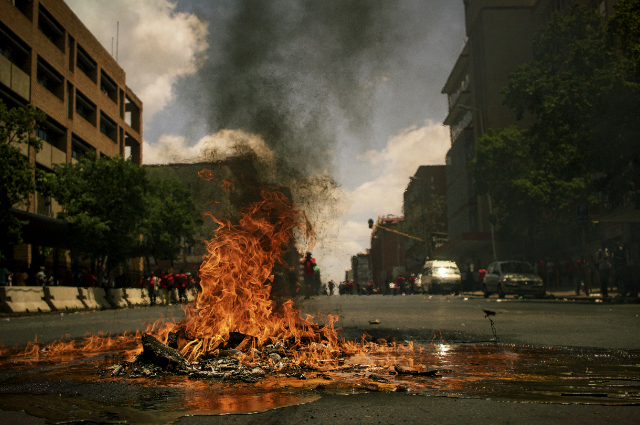
Photo by Pawel Janiak on Unsplash
The protests have resulted in 366 fatalities over the span of 36 days, highlighting the severe impact of the unrest on the nation's political landscape and social stability. The situation remains with ongoing demands for reform and accountability from the government.
The Rise and Fall of Sheikh Hasina
Bangladesh Prime Minister Sheikh Hasina has recently returned to the power of the people, a force that once drove her to the highest office in a remarkable political transformation in the post-colonial era. Her journey from a quiet homemaker to a prominent political figure is deeply entangled with the history of Bangladesh itself.
A Turbulent Beginning
In 1971, Sheikh Hasina was an ordinary woman, the daughter of Sheikh Mujibur Rahman and the leader who fought for Bangladesh's independence. The landscape of her life changed dramatically in 1975 when a military coup resulted in the assassination of nearly her entire family, including her father. Fortunately, she found refuge in India, thanks to the intervention of then-Prime Minister Indira Gandhi.
It was only in 1980, after Indira Gandhi returned to power then that Hasina felt safe enough to return to Bangladesh. Upon her return, she took charge of the Awami League, a party that had been demoralized by years of military rule. Through persistent efforts and a commitment to reform, Hasina led her party to victory in the 1996 elections by becoming the Prime Minister.
Struggles and Resilience
Her first term in office was marked by significant challenges including threats from religious extremists and attempts on her life. After losing the 2001 elections, Hasina found herself back on the streets advocating for her party. In July 2004, she survived a grenade attack during a rally which killed many of her colleagues. This attack profoundly affected her, instilling a belief that her safety depended on her political power. During the military-backed caretaker government from 2006 to 2008, Hasina faced imprisonment on what her supporters claimed were made-up charges. This period also saw her political rival, former Prime Minister Khaleda Zia, jailed. However, when elections were finally held, Hasina led the Awami League to a decisive victory reclaiming the Prime Minister's office for the second time.
Since then, Hasina has remained in power by winning three successive and contentious elections. She is credited with Bangladesh's remarkable economic growth which has benefited many citizens. However, her tenure has also been criticized for increasing authoritarianism and a decline in democratic practices. Reports of widespread corruption and rising prices have fueled public anger, concluding in the recent anti-quota protests that ultimately led to her downfall.
In 2018, following student protests against excessive government job quotas, Hasina's government initially decided to eliminate the quotas. However, when the High Court reinstated them on June 5th protests had erupted once more. Instead of engaging with the students, Hasina responded with aggression which intensified the protests. The situation escalated as police cracked down on demonstrators, leading to the deaths of around 300 people, mostly students during the unrest. This massive movement, led by students had recovered the historical role of student activism in Bangladesh's political landscape.
The Uncertain Future
At 76 years old, it seems unlikely that Hasina will return to power. As one of the longest-serving female leaders her legacy is complex. While she has overseen significant economic advancements and strengthened the Awami League, critics argue that her later years in office have undermined these achievements. Corruption has become widespread, the electoral process has been questioned and nepotism has flourished with many of her family members holding positions in parliament.
For India, Hasina was a reliable ally who addressed security and connectivity issues effectively. However, with her departure from office the future remains uncertain. The opposition, led by Khaleda Zia, has indicated that any agreements made with India during Hasina's tenure could be revisited. Moreover, the recent protests had a notable anti-India sentiment as many demonstrators viewed India as a supporter of Hasina's government.
In Sheikh Hasina's political journey reflects both the triumphs and challenges faced by Bangladesh. Her legacy will be judged not only by her achievements but also by the circumstances that led to her political career controversial highlighting the ever-evolving dynamics of power in the nation.
Awami League Leaders and Hindu Families remain underground as Violent Attacks against minorities Persist
The situation has taken an ugly turn for many in Bangladesh. "Every night, we hear about Hindus, Awami League supporters, and artists being targeted. We couldn’t have imagined a day would come when we would have to flee our homes and hide in our locations," shared some of the people in Bangladesh. For those connected with the Awami League, this sudden displacement has been a harsh and unanticipated reality.
Even casual interactions have become tense with anxiety. Several Awami League members and supporters who were contacted responded with a simple "namaste" emoji or did not reply at all. Some even requested the deletion of their responses, indicating the severe threat they face. A Bangladeshi Hindu known for being outspoken had sent a brief message: "In a safe location, but hearing a lot of news from friends."
Narrow Escapes and Constant Vigilance
The violence has been widespread and relentless. Arif Prodipto Ali, a member of the Chhatra League (the student wing of Hasina’s party) from Rangpur, narrowly escaped an attack in Alamnagar. He describes the situation as horrible: "Many of our leaders have either been killed or abducted. I somehow managed to escape."
Meanwhile in Dhaka, military personnel are on high alert as members of the opposition Bangladesh Nationalist Party (BNP) rally outside their headquarters. The tension in the city is intense with both sides bracing for further unrest.
Indian Students in Bangladesh Face Uncertainty
The chaos had also impacted Indian medical students in Dhaka, who find themselves in a dilemma. With hospitals overwhelmed by the wounded, students are torn between staying to help or fleeing for safety. "The college authorities have shut the gates and we are safe inside. The sounds of gunshots pierce the air, creating a sense of immediate danger and fear even in our rooms," said Promit Saha, an Indian intern at Pioneer Dental College and Hospital in Dhaka. Despite the chaos, Saha has decided to remain in Bangladesh although the disruptions have severely impacted daily life and academic schedules. Shortages of essential supplies like food, water, electricity, and gas have only added to the students’ distress.
The Indian Ministry of External Affairs has facilitated the evacuation of around 7,500 to 8,000 students from Bangladesh. However, any student wishing to return still has the option to contact the Indian High Commission for assistance.
Communal Tensions and Acts of Protection
For those who remain, the situation is alarming. "My home was attacked and vandalized. Goons have taken over. Arson and killing have become the norm. The police are nowhere to be seen," suffered another member of the Chhatra League.
Yet, amidst the fear and violence, there are stories of solidarity. Dhaka-based filmmaker Shankha Dasgupta, one of the few who has chosen not to flee had expressed gratitude to his Muslim friends who have gone to great lengths to protect him and his family. "Many of my other friends are in hiding. In some areas, minorities are being attacked by radicals, while in other areas, Muslim friends and neighbours are protecting them," he shared.
Dasgupta highlighted the destruction of Hindu temples which have been a particular target. In some neighbourhoods, however, these temples have been spared and thanks to the protection offered by local Muslims. Yet, the overall situation remains deeply unsettling with Hindu families under constant threat. "Some Hindu families I know were attacked and their houses set ablaze," he added.
A Call for Peace Amidst Chaos
The announcement that an interim government led by Nobel laureate Muhammad Yunus would take over may have brought relief, but the fear among minorities continues. The past few days have left deep scars and there is a pressing need for the administration to restore a sense of security.
As Dasgupta pointed out, "This country belongs to everyone. It is the duty of law enforcement agencies to take down those breaking laws. As a country, we have to raise our voice against this." His words echo the sentiments of many who hope for peace amidst the chaos that has engulfed Bangladesh.
Saving the Democracy: Will the interim government formed pass the test of conducting free and fair elections?
The interim government in Bangladesh, led by Nobel Laureate Muhammad Yunus faces a difficult challenge. Appointed by President Mohammed Shahabuddin with consultation from the country’s defense authorities and the Anti-Discrimination Students Movement, Yunus’s administration must restore stability, break the targeted attacks on Awami League members and confront various powerful forces. Although, Yunus is known for his courage and determination, questions remain about whether he has the necessary authority to take on the deep-rooted political and fundamentalist groups that have recently caused chaos.
Yunus must navigate three major challenges. First, is the political coalition that has gained influence since the removal of Sheikh Hasina, the former Prime Minister. Second, the military which previously consulted with the Jamaat-e-Islami and the Bangladesh Nationalist Party (BNP) before engaging with student leaders through the president remains a powerful player. Lastly, ensuring that the upcoming elections by following the dissolution of parliament are fair and credible is critical for restoring public trust and order.
Yunus’s Role: Limited Autonomy
Despite his reputation, Yunus is working within constraints. He has agreed to lead an administration where many decisions have already been made by others. His role seems more about implementing a pre-determined plan than shaping the country's future independently. The military and the political groups it engaged with following Hasina’s departure will likely have the final say in major decisions by raising doubts about Yunus's ability to act autonomously.
Yunus’s acceptance of this role is surprising. In 2007, he declined an offer to lead a controversial caretaker government. His current willingness to take on this role, despite its military associations marks a significant shift from his previous stance particularly given his contentious history with Hasina. This change suggests that Yunus is now more willing to align with anti-Hasina forces, a move that could significantly alter Bangladesh's political landscape.
New Power Dynamics in Bangladesh
Sheikh Hasina's resignation does not mark the end of the Awami League’s influence. The immediate violence following the army’s takeover suggests a settling of political scores rather than a new beginning. The student and youth organizations that participated in the uprising did not control the subsequent violence that engulfed the country. Their hopes for a second liberation and the restoration of democracy are quickly fading as Hasina’s departure did not bring the freedom or justice they sought.
The Illusion of Liberation
The end of Hasina’s rule did not liberate Bangladesh. Instead, it led to a regime change without an election that was facilitated by violence and the suppression of civil rights. The army’s announcement of an interim government led by Yunus may have been an attempt to calm public anxiety, but it was an empty gesture. The crisis is far from over as the student movement, which initially resisted military involvement has now inadvertently supported the new regime that lacks genuine democratic legitimacy.
India must closely monitor the unfolding situation in Bangladesh. The political turmoil combined with economic instability and widespread disillusionment, poses risks not only to Bangladesh but also to regional stability. The unrest reflects deeper issues such as unemployment, dissatisfaction with temporary jobs, and a growing distrust in leadership. These conditions if left unchecked could lead to a larger confrontation with significant consequences for both countries.
Conclusion: A Precarious Path Forward
The path ahead for Yunus and Bangladesh is troubled with uncertainty. Restoring civilian order without military intervention is crucial, but the authority to achieve this remains in question. As the country navigates this precarious transition, the broader implications for the region cannot be ignored. The lessons for neighbouring India are clear that political instability, if not addressed promptly can quickly escalate into a crisis that goes beyond borders.
. . .
References:

